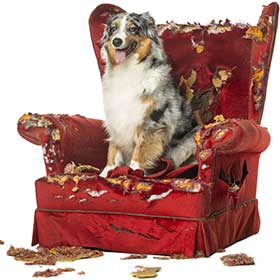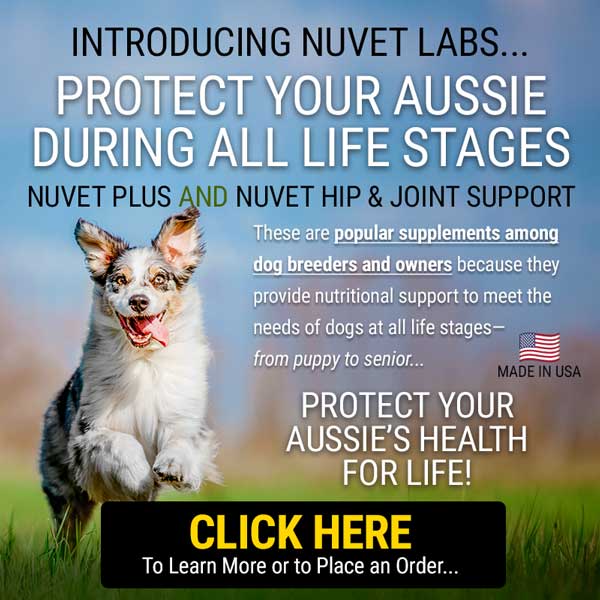
How To Stop Dog Chewing Before You Are Driven Crazy—And Financially Ruined
To Stop Dog Chewing, Knowing The Cause Will Lead You To The Solution

If you don't train puppies right from the start you may have more problems trying to stop your dogs from chewing inappropriate things later.
As I came home I was hoping to find my two dogs happily greeting me at the door. Well, they were happy but not for the right reasons. When I first saw them I was overwhelmed with a cascade of emotions: disappointment, shock, anger and horror as I thought about how much this was going to cost me.
They were both on the couch. Not the tattered couch in the rumpus room—they were in the living room going for the good furniture. They were standing on the living room couch engaged in a frenzied game of tug of war. With one of their toys or a piece of rope? No. No, it was the middle couch cushion, or what was left of it, that had them so enthused they didn't even hear me come in.
The rest of the couch didn't fair much better. It seemed they had left this cushion for last. It was now they finally noticed I was there. As the last pieces of stuffing floated to the floor they stood looking at me from a pile of shredded foam and fabric as if to say "Oh, hi there. We're having a great time! Why don't you come and join us?" Grrr.
If you want to figure out how to stop dog chewing, whether it's your furniture, clothes, walls, treasured heirlooms or anything else they can get their teeth onto you will want to get a better understanding of why your dog is chewing things.
Why, Oh Why, Is Your Dog Chewing?
There can be many reasons your dog chews. With my dogs it could have been boredom and a bit too much energy. One started, the other joined in the fun and soon it was an out-of-control party.
It could simply be curiosity. There are so many smells, tastes and textures that it's hard to resist. After all, dogs explore and interact with the world, in large part, with their mouths. So it's only natural that a little exploring leads to a little nibbling and then a whole lotta chewing. (I can't believe I chewed the whole thing!)
Other causes like stress or separation anxiety can contribute. So it's important to know why your dog is chewing. If they were upset and you come home to find damage and fly into an angry outburst you could well be upsetting them more, creating more stress and making the problem worse.
As with many dog behavior problems, they are not due to bad dogs but misinformed owners who are unintentionally contributing to the behavior. As a responsible dog owner you have to be commended for taking the time to visit this site and research further into the causes of dog chewing.
Too often people will just anthropomorphize their dogs and assume human-like motivations. They are angry at me. They are getting even. They are trying to upset me. Of course, dogs don't operate this way. I'd say this is one of the things I like better about dogs than many people. ;)
An Overlooked Possibility of Inappropriate Dog Chewing
An overlooked possibility is an actual medical condition that needs attention. Dogs that chew may be experiencing gastrointestinal distress. For example, hunger, nutritional deficiencies, diabetes, thyroid conditions or parasites can result in conditions like pica. Pica (or eating things that aren't food) or eating feces (coprophagia) can have dangerous consequences.
This is why if your dog is chewing you need to consult your veterinarian to make sure medical conditions are not the root cause of the chewing and that the chewing has not resulted in medical issues. Many dogs swallow non-food items and have been found to have eaten everything from marbles and rocks to phone cords and bottle caps.
To stop dog chewing in the first place you will want to do everything you can to eliminate potential temptations from your home. Obviously, the garbage or anything else with food smells will need to be secured. However, what other things are in your dog's environment that they could get into? You may have to get down on the floor to your dog's level and survey the room. The fewer temptations, the less chance there is for your dog to chew or swallow something they shouldn't.
A Teething Dog Is A Chewing Dog
The age of your Aussie is also very important as one of the main causes for dog chewing is teething.
Puppies will usually begin to get their teeth between three and eight weeks and is a painful process. Chewing helps relieve the pain. This is the best time to teach them about which things are appropriate to chew on. If they can learn the difference between their chew toys and your shoes you will be better off later.
Later dogs will get their permanent teeth at about four to six months. So the foundation you built as a puppy will be tested again.
Page 1: How To Stop Dog Chewing | Part 1
Page 2: How To Stop Dog Chewing | Part 2
Have Dog Training Questions?
Check out these introductory dog training videos...
I want my dog to stop being aggressive.
I want some help training my new puppy.
I want my dog to stop barking at everything.
Get Australian Shepherd Info, Website Updates, Special Offers, and Cartoons...
FREE GIFT
You'll also receive a free copy of the ebook
My Everyday Dog Training Tools
by professional dog trainer Daniel Abdelnoor, "Doggy Dan"










 Loading Image...
Loading Image...